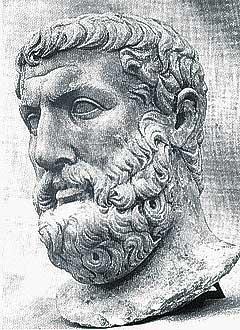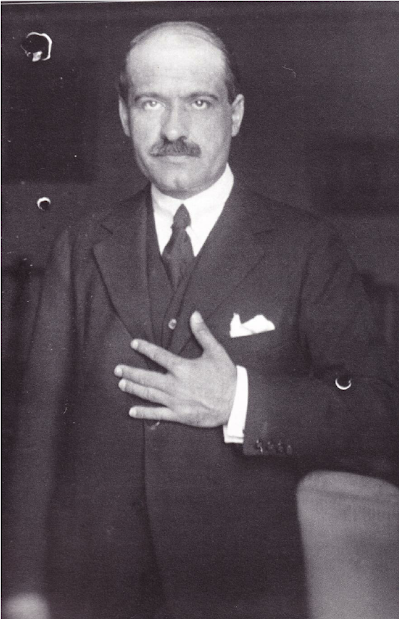The Soil and Sub-Soil of Our Ideas and Worldview - Ch. 8 "The Origin of Philosophy" - Jose Ortega y Gasset
The Attitude of Parmenides and Heraclitus
Chapter 8 of The Origin of Philosophy gets into a fundamental topic for Gasset in the exploration of the meaning of philosophy as a whole. And this is that philosophy is neither religion nor physical science, it traverses between the two. He is not denying the existence of the metaphysical, rather Gasset seems to suggest that the discovery of truths about reality constitute a type of "mystical" experience. Why is this the case? Well, reality is intelligible, and so to discover a law which has governed the fabric of the universe is to discover something which transcends the physical and changing world. As he describes in ch. 1 of What is Philosophy? it is like the Platonic forms which are eternally the same and at points in history fall through the cracks of reality into the mind of man for him to understand its secret.
Likewise he also makes the point that all religion, philosophy, and language exists within a worldview. It exists in a temporal place and time by which it is conditioned. Gasset focuses a lot in this chapter on the mode of expression that philosophy took in Ancient Greece. He talks particularly about Parmenides and Heraclitus, and how they co-opted religious modes to convey the depth of their philosophical insight. He again brings up the concepts of "sub-soil" and "soil" to express this. When we live in a particular time, there are ideas which lay at the foundation of reality that we participate in but don't see consciously, and then those ideas which more directly confront us and call us to respond. Lastly, this is also to suggest that philosophy cannot be described in terms merely of the physical sciences. They require religious, poetic, or literary language to access these mysteries.
Religious Modes of Language - Parmenides
Gasset begins chapter 8 by asking about the intellectual culture which Parmenides and Heraclitus wrote in Ancient Greece. He claims that Parmenides does not address any particular individual people, positively or negatively, and does this on purpose. The style of writing that Parmenides was using at the time was an imitation of the Ancient Greek Theogonic poem. He uses imagery, words, from the mythological tradition to express his philosophy. "Parmenides poured his ideas into the mold of a solemn poem, which is in keeping with the most characteristic literary genre of the period - the theological-cosmogenic poem of the Orphic mystics." 1
Gasset mentions that as mythological beliefs begin to die out there is a transformation that occurs in a society. At first, there is a mix of believers and those who have abandoned the beliefs, and so a dialogue continues in which they wrestle and try to clarify these beliefs. After this stage, when all belief has been abandoned, the mythology becomes something of a mode of speaking or communicating. Thus, Parmenides has used this genre for the vocabulary of his ideas. "The defunct beliefs lasted for a long time transformed into mere words. Mythology, once it is dead, has an awesome tenacity. While a belief that is not ours remains alive in others, we take it seriously and grapple with it, and at the least take care so that what we say is not confused with what its adherents say. When, however, we regard a belief to be mummified, it becomes merely an innocuous 'manner of speaking.'" Parmenides uses mythological characters to represent the journey of understanding truth, a journey which leads one to the gates of Heaven, the highest form of existence.
 |
| Parmenides |
The question, though, is why Parmenides chooses this style to deliver his philosophical ideas. 2 "...we are obliged to explain is why this man needed a disguise to say what he wished, why he believed it expeditious to feign a religious, mythological, tone so that the resounding thunder of his ideas might descend upon us as pathetic outpourings, delivered in a revelatory, apocalyptic tone via a goddess' lips." Gasset makes the claim that Parmenides is doing this for an emotional effect. These truths are so dear to him that they take on a mystical type of emotion for Parmenides. Even the cold truths of science exist within a real person who discovers a new vision of the landscape of reality. 3 This uncovering of reality through truth is likewise a mystical or religious experience, justifying Parmenides choice of style. "Every 'scientific discovery - that is, every truth - suddenly confronts us with an immediate vision of the world, hitherto unperceived and hence not taken into account. Abruptly, as though a veil were removed, it becomes marvelously evident to us - we become 'visionaries' - and in addition feel as though we have been overcome by some strange power and uprooted from our habitual 'bourgeois' and totally unmystical world into another one - we fall into ecstacy or 'rapture.'"
Religious Modes of Language - Heraclitus
The point that Gasset is trying to make by talking about Parmenides use of religious imagery for his philosophy is that the discovery of truth is a touching of the metaphysical realm. The religious imagery captures the emotional magnitude of the discovery. Descartes had this same experience as he first discovered mathematical truths, holding that it was a gift from the transcendent, something he received, and was the most meaningful moment of his life. 4
Heraclitus, on the other hand, wrote in a very direct way, calling out by name many of his predecessors. 5 He spoke directly from his unique personhood and experience, rather than couching his ideas through some other mode or guise as Parmenides did. 6 Gasset questions, though, if the style of Heraclitus worked for the writing of philosophy, given that he wrote is spurts of prose which emanated from a mind prideful and purely individualistic in itself. "Nevertheless, it was prose that was still inadequate for expounding the strange, transcendental thought that was to be philosophy." 7 And, yet, while this particular style of electric, compressed, pronouncements did not pan out as well for philosophy, Gasset points out that even this was a mode of speaking that drew from a religious tradition, the oracular religious tradition which gave prophetic "'suggestions'" as to the nature of your fate. 8
[As a side note, Gasset makes the point in a footnote that crafting the correct mode of type of language that is perfectly fit to deal with philosophy is almost impossible. Even the great Aristotle struggled with his. Thankfully we have his lecture notes. But the point is here that there are different styles or modes which the philosophical endeavor, or experience, can be expressed in. Gasset also makes a comment about how he is tired of people saying that he writes literature, not philosophy, because his use of words is so beautiful.]
Sub-Soil and Soil
"His discoveries were experienced along with an aspect of revolution, and the mystical impact of this experience found its natural expression in sentences quivering with quasi-religious emotion." Though neither Parmenides nor Heraclitus believed in the mythological gods, it was the "sub-soil" of the culture in which they expressed themselves. Therefore, the mystical experience of uncovering truth would naturally take the form of religious language. 9 The "soil" of their time was that of the Ionian school of thinkers which emerged in Ancient Greece, a school which began the philosophical movement. 10 Likewise in the soil of their time was a new expression of religion and theology in the Orphic and Dionysian mystery cults. This also involved a more rigorous look at theological propositions, rather than just staying at the stories of the mythologies. 11 Heraclitus focused on attacking the newer forms of theology, rather than the old mythology, as he assumed that the older beliefs had been abandoned. "It only survived among the 'common people'." 12
 |
| Jose Ortega y Gasset |
To conclude, Gasset makes the point that it is only possible to understand the thinkers in the past by understanding, also, the contemporary "adversary" which they wrote against. He defines adversary as, "... a contemporary, something standing in the same soil and holding much in common. One does not combat that which is totally alien." 15 Likewise, Gasset's definition of generation and contemporary is also unique. He mentioned earlier in the book, but also repeats in this chapter, his view that a generation is only 15 long. This is the amount of time it takes for the population to split amongst itself. Therefore, every contemporary time period is made up of three sets of generations all living together with their unique experience. 16 And so, one must understand the whole milieu of the time to understand the writer. The writer cannot express himself except in words that reflect the world that he lives in. "History, as I was saying, signifies not only recounting the past but understanding it, it of necessity likewise means criticizing it, and consequently becoming enthused, anguished, and irritated by it, censuring, applauding, correcting, and completing it, crying and laughing over it." 17
-----------------------
1 - Ortega y Gasset, Jose. The Origin of Philosophy. WW Norton Company (New York, 1967) Pg. 79
2 - 80
3 - 81
4 - 82
5 - 83
6 - 84
7 - 85
8 - 86
9 - 87
10 - 88
11 - 90
12 - 91
13 - 92
14 - 93
15 - 94, 95, 96
16 - 90, 91
17 - 96





Comments
Post a Comment